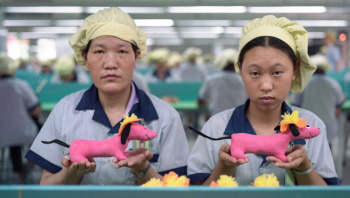
No more Chinese junk
Recently, senior Montgomery analyst Andrew Macken explained how dangerous it is for anyone to invest in any Chinese company listed on the ASX, or even an exchange in the US.
Local auditors do not have access to the relevant financial and business information because the Chinese government regards the information as a “State Secret”. Therefore, the information required to make any assessment of a company’s quality or value useful, is unavailable.
The quality of the financial information provided to investors should be regarded as you might regard the quality of much of the Chinese merchandise that fills our tips and garbage dumps after Christmas. Junk.
“Last month, the US Securities and Exchange Commission (SEC) caved in to Beijing’s refusal to turn over corporate information to US regulators. The SEC had the right to de-list all Chinese companies from US exchanges for being in breach of the Securities Exchange Act. They chose not to.
A Wall Street Journal editorial at the time pointed out why this has become such a concern for US investors and regulators:
“The SEC has long sought access to the auditing records of Chinese companies suspected of fraud. Tens of billions of dollars in U.S. market value have disappeared in recent years as more than 170 U.S.-listed Chinese companies have faced scrutiny for embezzlement, theft, misrepresentation and other alleged abuses.”
In today’s Australian Financial Review, John Kehoe has written about the limited quality of Chinese companies listed on foreign exchanges that has once again ensnared investors, triggered fines for the advisers but allowed the fraudulent Chinese company directors to apparently walk away, untouched.
According to the AFR article, contrary to what investors were told “about the planned $US100-million-plus share offering, the December 2010 report revealed that Puda Coal no longer owned any of a previously-held 90 per cent stake in China’s Shanxi Coal; Puda’s principal asset and sole source of revenue. Puda had become an empty shell company after Chairman Ming Zhao secretly transferred the coal mine asset to himself.”
Don’t kid yourself, Australian auditors do not have access to the information you require to safely invest your capital. You can read Andy’s blog highlighting an Australian example here.
Roger Montgomery is the founder and Chief Investment Officer of Montgomery Investment Management. To invest with Montgomery, find out more.
And just like the garbage that fills our tips and landfills, there are always people who are ready to buy such junk…either in the shop, or in the sharemarket.
Good point to bring to attention, Roger. There are also very significant non-performing Chinese fixed asset investments in other countries, for example in Australia. One specific example I want to discuss is the Sino Iron project in WA. This project is now running at least 4-5 years behind schedule, I believe, and a few billion dollars over budget (if you believe the most recent announcements from CITIC, the owner of this project, they have just written off another $ 2+ billion due mainly this project. Sino Iron concentrator was going to be the largest magnetite concentrator in the world, processing on the average, about 85 Mtpa magnetite ore producing, on the average about 25 Mtpa high value magnetite concentrate. All of the the originally designed 6 processing lines should have been operating by now. But what they have is only two processing lines operating. Then again, these two lines are not operating at full design capacity. All major equipment for the other four lines are in place (installed, so money has been spend on those). If you have only two processing lines operating, out of six lines, you have spend the Capex, what would happen to your profitability? How would you show it in your annual statements? Can you trust them? I wonder how many ore processing plants around the world, designed and built with the Chinese money, are in this situation? We know this because this is all happening right here. It may be that CITIC is too big not to adversely affected by non performing projects like this.